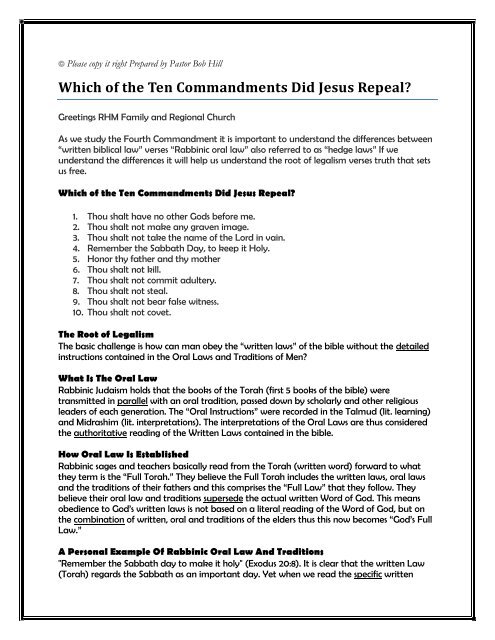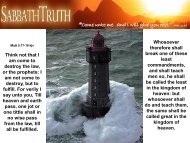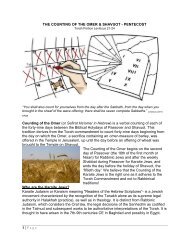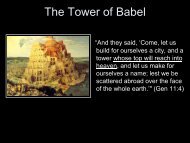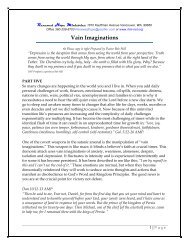Which of the Ten Commandments Did Jesus Repeal? - Rhm-Net.org
Which of the Ten Commandments Did Jesus Repeal? - Rhm-Net.org
Which of the Ten Commandments Did Jesus Repeal? - Rhm-Net.org
Create successful ePaper yourself
Turn your PDF publications into a flip-book with our unique Google optimized e-Paper software.
iblical laws regulating how to observe <strong>the</strong> day, you find only a few injunctions like notworking, pursuing your own interests, call <strong>the</strong> Sabbath a delight, honor it by not doing yourusual things and pursuing your interests. If you refraining from <strong>the</strong>se few activities it wouldfulfill <strong>the</strong> biblical command to make <strong>the</strong> Sabbath holy (Isa. 58:11-14).During a visit to Israel I found myself breaking “Rabbinic Oral Law” at dinner in our hoteldining room. We were having supper at about 7 pm on Sabbath. A Jewish couple in our diningroom just announced <strong>the</strong>ir engagement to everyone in <strong>the</strong> room. As Goyim (a gentile) Isnapped a picture <strong>of</strong> <strong>the</strong> happy couple, a hush took over <strong>the</strong> room! Why? Because I broke anOral Law on <strong>the</strong> Sabbath! My camera flash was considered lighting a fire. There are literallythousands <strong>of</strong> “hedge laws” like this for <strong>the</strong> laws written in <strong>the</strong> bible.These hedge laws were written so people would have to break through <strong>the</strong> oral hedge before<strong>the</strong>y could break a written law. When you read <strong>the</strong> scripture closely you will see that <strong>Jesus</strong> andPaul confronted <strong>the</strong>se “hedge laws” repeatedly. They never once disavowed <strong>the</strong> “WrittenWord <strong>of</strong> God” only <strong>the</strong> Oral Hedge Laws and The Traditions <strong>of</strong> Men. For example <strong>Jesus</strong> wasfaulted for healing on <strong>the</strong> Sabbath. The Pharisee’s were not mad about healing <strong>the</strong>y wereupset that He broke oral traditions on <strong>the</strong> Sabbath.Now that we have a basic understanding <strong>of</strong> written law verses <strong>the</strong> legalism <strong>of</strong> Rabbinic orallaws we can now ask this question, did <strong>Jesus</strong>’ death on <strong>the</strong> cross actually repeal any <strong>of</strong> God’sWritten Laws? Let’s discuss how laws are repealed and you decide if God’s written laws wererepealed at or abolished at <strong>the</strong> cross.Most Christians reject legalism while assuming that obedience to God’s written laws is legalism,yet this is not <strong>the</strong> true at all. Legalism is rooted in men’s traditions and is not confined to Jewishpractices. It can be found in western <strong>the</strong>ology as well. So oral laws and traditions <strong>of</strong> men arenot unique to Rabbi’s and Israel. The root <strong>of</strong> legalism is not <strong>the</strong> laws found in <strong>the</strong> bible, but in<strong>the</strong> way men build hedges around <strong>the</strong>m.My Approach To God’s Written Laws1. There are no bad laws in <strong>the</strong> Word <strong>of</strong> God.2. God would never give mankind a law that was bad for <strong>the</strong>m.3. The Law <strong>of</strong> God is not arbitrary.4. When God speaks to mankind He tells <strong>the</strong>m something that is good for everyone.5. The scripture is man’s instruction book and God wants to communicate to man about hisway <strong>of</strong> life.6. Revelation <strong>of</strong> His Laws will keep mankind from unnecessary hurt, trouble and heartacheas we live in this sinful world.7. I ask myself, what does this mean, what lies behind this commandment and what is <strong>the</strong>underlying principle God is warning us about?8. I ask myself how this might actually apply in real life.9. Grace is not seen as a substitute for law, but ra<strong>the</strong>r as a higher motivation to obey God’slaws.10. If I change my mind God will change my heart.11. Obedience brings <strong>the</strong> blessings, disobedience brings <strong>the</strong> cursings.<strong>Jesus</strong> and Paul were not urging freedom from <strong>the</strong> Law……, but from <strong>the</strong> laws written by mento enforce <strong>the</strong> law that was already on stone…….and contained within <strong>the</strong> written word <strong>of</strong>
God. If you want to know how to perform <strong>the</strong> Laws <strong>of</strong> God ask Him to show you. Tryconsidering <strong>the</strong> eleven questions I have listed above; “when <strong>the</strong> Spirit <strong>of</strong> Truth comes, he willguide you into all <strong>the</strong> truth; John 16:13-14 CJB<strong>Which</strong> <strong>of</strong> <strong>the</strong> <strong>Ten</strong> <strong>Commandments</strong> <strong>Did</strong> <strong>Jesus</strong> <strong>Repeal</strong>?Was <strong>the</strong>re something wrong with <strong>the</strong> <strong>Ten</strong> <strong>Commandments</strong>? Were <strong>the</strong>y weak legislation in <strong>the</strong>first place? <strong>Did</strong> <strong>the</strong>y somehow become obsolete with <strong>the</strong> passage <strong>of</strong> time? Some teach <strong>the</strong> lawhas passed away if that is true, it would mean <strong>the</strong> <strong>Ten</strong> <strong>Commandments</strong> were abolished. If true<strong>the</strong>re must have been a reason for it. When we do repeal laws, why do we do it? There aremany reasons for abolishing laws.1. The law may be unenforceable.2. It may be unpopular with <strong>the</strong> people, and because <strong>of</strong> massive disobedience it isrepealed.3. The law simply can’t be maintained.The classic example <strong>of</strong> this was <strong>the</strong> prohibition <strong>of</strong> alcohol in <strong>the</strong> early 19 th century. We couldpoint to dozens <strong>of</strong> examples, but <strong>the</strong>re is still only one fundamental reason for <strong>the</strong> repeal <strong>of</strong> alaw; it was a bad law in <strong>the</strong> first place, or it became a bad law in time. For which <strong>of</strong> <strong>the</strong>sereasons did <strong>Jesus</strong> repeal <strong>the</strong> <strong>Ten</strong> <strong>Commandments</strong>? Do you see <strong>the</strong> problem we’re dealing with?Its one thing to create a doctrinal argument to <strong>the</strong> effect that God abolished <strong>the</strong> law, but it’sano<strong>the</strong>r matter altoge<strong>the</strong>r to explain why such a thing law should be obeyed.This brings us logically to <strong>the</strong> next question. The question is simple enough.What Happens When A Law Is <strong>Repeal</strong>ed?The answer is simple. When a law has been abolished or repealed, it is no longer a crime tobreak that law. Technically you cannot break it because it no longer exists. An action thatpreviously was considered a crime, worthy <strong>of</strong> punishment is now deemed acceptable.During prohibition, you could have gone to jail for having alcohol in <strong>the</strong> trunk <strong>of</strong> your car.After prohibition was repealed, that same alcohol made you no more a criminal than asuitcase full <strong>of</strong> clo<strong>the</strong>s. Once a law is repealed or abolished, <strong>the</strong>re are no more penalties, nomore guilt, no fines, no imprisonment not even an admonition from <strong>the</strong> judge. You cannotbreak <strong>the</strong> law, for it is no longer a law.Perhaps <strong>the</strong> laws <strong>of</strong> God are different. Can <strong>the</strong> <strong>Ten</strong> <strong>Commandments</strong> be abolished and yet itstill is wrong to break <strong>the</strong>m? If <strong>the</strong> laws have been abolished <strong>the</strong>n so were <strong>the</strong> <strong>Ten</strong><strong>Commandments</strong>. John categorically defined sin, so no one could misunderstand: “Sin is <strong>the</strong>transgression <strong>of</strong> <strong>the</strong> law” (I John 3:4). What happens to sin, <strong>the</strong>n, if <strong>the</strong> law is abolished? Listento Paul’s reply: “For where no law is, <strong>the</strong>re is no transgression” (Romans 4:15). Later in <strong>the</strong> sameepistle, Paul affirms, “Sin is not imputed when <strong>the</strong>re is no law” (Romans 5:13).Let’s see if we can understand what this means. Suppose for a moment <strong>the</strong> Commandment“Thou shalt not steal” is abolished. (if <strong>the</strong> <strong>Ten</strong> <strong>Commandments</strong> are abolished, that law nolonger exists). Since <strong>the</strong>re is no transgression where <strong>the</strong>re is no law, <strong>the</strong>n it is not a transgression
to steal. In that case, <strong>the</strong>re is no penalty, no guilt, and no f<strong>org</strong>iveness needed. If <strong>the</strong> whole lawwere abolished, <strong>the</strong>n how do we know what sin is? No law <strong>the</strong>n no sin.Since no one suggests that it’s all right for a Christian to steal, why do <strong>the</strong>ologians in <strong>the</strong>western church argue that <strong>the</strong> law which includes <strong>the</strong> <strong>Ten</strong> <strong>Commandments</strong> were abolished?Some argue that “<strong>the</strong> law <strong>of</strong> love” keeps us from stealing. But why should love keep us fromdoing something that isn’t wrong anymore? And, if it is still wrong to do it, why argue that <strong>the</strong>law was abolished?What Have We Missed In All Of This?Is it possible that those who advance this argument don’t really believe that <strong>the</strong> <strong>Ten</strong><strong>Commandments</strong> are abolished? But what <strong>the</strong>y really mean is, that <strong>Jesus</strong> delivered us fromimputed punishment <strong>of</strong> <strong>the</strong> law (eternal separation) and not from <strong>the</strong> law itself. We need <strong>the</strong>law to reveal sin and to clarify what righteousness behavior is. What <strong>Jesus</strong> did was save us from<strong>the</strong> curse <strong>of</strong> breaking God’s laws, which brings <strong>the</strong> second death <strong>of</strong> eternal separation.The Sermon on <strong>the</strong> Mount is one <strong>of</strong> <strong>Jesus</strong>’ most fundamental teachings. In <strong>the</strong> Sermon on <strong>the</strong>Mount <strong>Jesus</strong> said: “Think not that I am come to destroy <strong>the</strong> law or <strong>the</strong> prophets: I am not cometo destroy but to fulfill” (Mat<strong>the</strong>w 5:17). How are we to understand this statement? Maybe,<strong>Jesus</strong> really meant to say it like this, “Think not that I am come to destroy <strong>the</strong> law or <strong>the</strong>prophets: I am not come to destroy but to abolish?” To complete (fulfill) <strong>the</strong> law is not <strong>the</strong>same as abolish or make <strong>the</strong> law pass away. His next statement is even clearer: “For verily Isay unto you, Till heaven and earth pass, one jot or one tittle shall in no wise pass from <strong>the</strong>law, till all be fulfilled.”Some say, “notice that <strong>Jesus</strong> fulfilled <strong>the</strong> law, and <strong>the</strong>n it was able to pass away.” The Greekword translated “fulfilled” in verse 18 is not <strong>the</strong> same word as <strong>the</strong> Greek word for “fulfill” inverse 17. We can even tell <strong>the</strong> difference between <strong>the</strong> two Greek words. The word in verse 17 isplerosai and <strong>the</strong> word in verse 18 is genetai. Here is how <strong>the</strong> two verses in context actuallyread. Ask yourself has this happened yet?“Do not think that I have come to do away with or undo <strong>the</strong> Law or <strong>the</strong> Prophets; I havecome not to do away with or undo but to complete and fulfill <strong>the</strong>m. 18 For truly I tell you,until <strong>the</strong> sky and earth pass away and perish, not one smallest letter nor one little hook[identifying certain Hebrew letters] will pass from <strong>the</strong> Law until all things [it foreshadows] areaccomplished.” Matt 5:17-18 AMPHave Heaven and Earth Passed Away Yet?Have all things written in <strong>the</strong> law and <strong>the</strong> prophets come to pass? Of course not. Then let usagree that <strong>Jesus</strong> meant precisely what He said not one jot or one tittle shall pass from <strong>the</strong> lawor <strong>the</strong> prophets till all <strong>the</strong>se things written in <strong>the</strong> law and <strong>the</strong> prophets have come to pass. <strong>Jesus</strong>continued in <strong>the</strong> same passage to explain <strong>the</strong> consequences <strong>of</strong> what He just said: “Whosoever<strong>the</strong>refore shall break one <strong>of</strong> <strong>the</strong>se least commandments, and shall teach men so, he shall becalled <strong>the</strong> least in <strong>the</strong> kingdom <strong>of</strong> heaven: but whosoever shall do and teach <strong>the</strong>m, <strong>the</strong> sameshall be called great in <strong>the</strong> kingdom <strong>of</strong> heaven” (Matt 5:19). Now, <strong>the</strong>se would be strange
words if <strong>Jesus</strong> intended to nail <strong>the</strong> <strong>Ten</strong> <strong>Commandments</strong> to <strong>the</strong> cross and abolish <strong>the</strong> o<strong>the</strong>r lawswritten in <strong>the</strong> bible.After <strong>the</strong> giving <strong>of</strong> <strong>the</strong> <strong>Ten</strong> <strong>Commandments</strong> and after Israel had boldly promised that <strong>the</strong>ywould keep <strong>the</strong> written laws, God said this about <strong>the</strong>m; “They have well said all that <strong>the</strong>yhave spoken. O that <strong>the</strong>re were such an heart in <strong>the</strong>m, that <strong>the</strong>y would fear me, and keep allmy commandments always, that it might be well with <strong>the</strong>m, and with <strong>the</strong>ir children forever!”(Deuteronomy 5:29).Do you think that we should have <strong>the</strong> <strong>Ten</strong> <strong>Commandments</strong> in our schools and courthouses? If<strong>the</strong> law has been done away with or abolished what good can <strong>the</strong>y serve? I have heard itpreached that <strong>the</strong> law has passed away and we are no longer under <strong>the</strong> law. Could Americabe reaping what is preached in <strong>the</strong> pulpits? Is this removal <strong>of</strong> God’s laws <strong>the</strong> reason why it isn’tgoing well in our nation and especially with <strong>the</strong> children <strong>of</strong> our nation?Contrast Between Letter and SpiritSpeaking <strong>of</strong> <strong>the</strong>se commandments, Paul said: “And <strong>the</strong> commandment which was ordained tolife, I found to be unto death” (Romans 7:10).Listen to Paul as he continues: “And <strong>the</strong> commandment which was ordained to life, I found tobe unto death. For sin, taking occasion by <strong>the</strong> commandment, deceived me, and by it slewme. Wherefore <strong>the</strong> law is holy, and <strong>the</strong> commandment holy, and just, and good. Was <strong>the</strong>nthat which is good made death unto me? God forbid. But sin that it might appear sin, workingdeath in me by that which is good; that sin by <strong>the</strong> commandment might become exceedingsinful. For we know that <strong>the</strong> law is spiritual: but I am carnal sold under sin” (Romans 7:10-14).Notice how Romans 7:7 aluminates verses 10-14. “What shall we say <strong>the</strong>n? Is <strong>the</strong> law sin? Godforbid. Nay, I had not known sin, but by <strong>the</strong> law: for I had not known lust, except <strong>the</strong> law hadsaid, Thou shalt not covet.”Where does “Thou shalt not covet” fit in <strong>the</strong> scheme <strong>of</strong> <strong>the</strong> law? It is <strong>the</strong> tenth Commandment.We need <strong>the</strong> law to reveal sin and what righteousness behavior should be. Without it we onlyhave what men say sin and righteousness is, God forbid………..His law is holy, just, and goodseparating carnal from spiritual.<strong>Jesus</strong> delivered us from imputed punishment <strong>of</strong> <strong>the</strong> law which brings eternal separation, butnot from <strong>the</strong> law that is holy, just and good. It is vain to argue that <strong>the</strong> laws <strong>of</strong> God wereabolished. A careful analysis <strong>of</strong> <strong>the</strong> <strong>Commandments</strong> <strong>the</strong>mselves may give us a clue. Whatreligion, denomination or sect, argues that it is permissible for a Christian to lie, covet, steal,commit adultery, kill or dishonor <strong>the</strong>ir mo<strong>the</strong>r and fa<strong>the</strong>r?The Sabbath Was Made for ManWhen you think about it, <strong>the</strong>re is only one <strong>of</strong> <strong>the</strong> <strong>Ten</strong> <strong>Commandments</strong> that is constantlycoming into question and that is <strong>the</strong> fourth commandment: “Remember <strong>the</strong> Sabbath day tokeep it holy.” In addition to <strong>Jesus</strong>’ support <strong>of</strong> <strong>the</strong> law, He also went to great lengths todemonstrate <strong>the</strong> true intent <strong>of</strong> <strong>the</strong> <strong>Ten</strong> <strong>Commandments</strong>, especially <strong>the</strong> fourth one.
“The Sabbath was made for man, not man for <strong>the</strong> Sabbath,” He declared (Mark 2:28). Againand again He demonstrated, by both word and action, that <strong>the</strong> Sabbath is a time <strong>of</strong> joyousliberation from <strong>the</strong> burdens <strong>of</strong> this physical life. It was <strong>Jesus</strong>’ custom to attend <strong>the</strong> synagogueeach Sabbath and on one occasion <strong>the</strong>re was a man who had a wi<strong>the</strong>red hand. Those presentwatched <strong>Jesus</strong> closely to see whe<strong>the</strong>r He would heal <strong>the</strong> man on <strong>the</strong> Sabbath.<strong>Jesus</strong> asked <strong>the</strong> man to stand up and turn to face <strong>the</strong> assembly. “Is it lawful,” He asked, “to dogood on <strong>the</strong> Sabbath day or to do evil? To save life or to kill?” But <strong>the</strong>y wouldn’t answer. <strong>Jesus</strong><strong>the</strong>n told <strong>the</strong> man to stretch out his hand and it was restored whole as <strong>the</strong> o<strong>the</strong>r hand. Earlier,He had healed a woman bowed over with a spirit <strong>of</strong> infirmity. Naturally, He healed her on<strong>the</strong> Sabbath day. When <strong>the</strong> ruler <strong>of</strong> <strong>the</strong> synagogue criticized His healing on <strong>the</strong> Sabbath, <strong>Jesus</strong>had harsh words for him: “Thou hypocrite, doth not each one <strong>of</strong> you on <strong>the</strong> Sabbath loose hisox or his ass from <strong>the</strong> stall, and lead him away to watering? And ought not this woman, beinga daughter <strong>of</strong> Abraham, whom Satan has bound, lo, <strong>the</strong>se eighteen years, be loosed from thisbond on <strong>the</strong> Sabbath day?” (Luke 13:15,16).In no way did <strong>Jesus</strong> break <strong>the</strong> Sabbath Commandment. He actually confirmed <strong>the</strong> Sabbathand <strong>the</strong> written laws by confronting and correcting <strong>the</strong> Pharisee’s misconceptions about <strong>the</strong>m.The blessings <strong>of</strong> this day were layered in “oral laws and traditions. The Sabbath was made forman and man needs to find Sabbath rest, without it we wear down both spiritually andemotionally leading to physical break downs. We all know that when we are tired and weary<strong>the</strong> carnal side <strong>of</strong> our nature begins to emerge. But, when we are rested <strong>the</strong> spirit man hasopportunity to wax strong. Could resistance and disobedience to <strong>the</strong> “Fourth Commandment”be <strong>the</strong> root <strong>of</strong> psychosomatic illnesses that are brought on from weariness, exhaustion, anxiety,depression, fear and frustration? God’s Word says it should be different! Isaiah tells us thatrenewed strength comes from finding our Sabbath rest.“And <strong>the</strong> Lord will guide you continually, and satisfy your desire with good things, and makeyour bones strong; and you shall be like a watered garden, like a spring <strong>of</strong> water, whosewaters fail not. 12 And your ancient ruins shall be rebuilt; you shall raise up <strong>the</strong> foundations <strong>of</strong>many generations; you shall be called <strong>the</strong> repairer <strong>of</strong> <strong>the</strong> breach, <strong>the</strong> restorer <strong>of</strong> streets to dwellin. 13 If you turn back your foot from <strong>the</strong> Sabbath, from doing your pleasure on my holy day,and call <strong>the</strong> Sabbath a delight and <strong>the</strong> holy day <strong>of</strong> <strong>the</strong> Lord honorable; if you honor it, notgoing your own ways, or seeking your own pleasure, or talking idly; 14 <strong>the</strong>n you shall takedelight in <strong>the</strong> Lord, and I will make you ride upon <strong>the</strong> heights <strong>of</strong> <strong>the</strong> earth; I will feed you with<strong>the</strong> heritage <strong>of</strong> Jacob your fa<strong>the</strong>r, for <strong>the</strong> mouth <strong>of</strong> <strong>the</strong> Lord has spoken.” Isa 58:11-14 RSV<strong>Jesus</strong> said it this way in Mat<strong>the</strong>w 28:11; "Are you tired? Worn out? Burned out on religion? Cometo me. Get away with me and you'll recover your life. I'll show you how to take a real rest. 29Walk with me and work with me — watch how I do it. Learn <strong>the</strong> unforced rhythms <strong>of</strong> grace.THE MESSAGE.Grace is not seen as a substitute for law, but ra<strong>the</strong>r As a higher motivation to obey God’s laws.We simply change our minds, and God changes our lifes.Blessings ,Pastor Bob Hill3/15/2009


